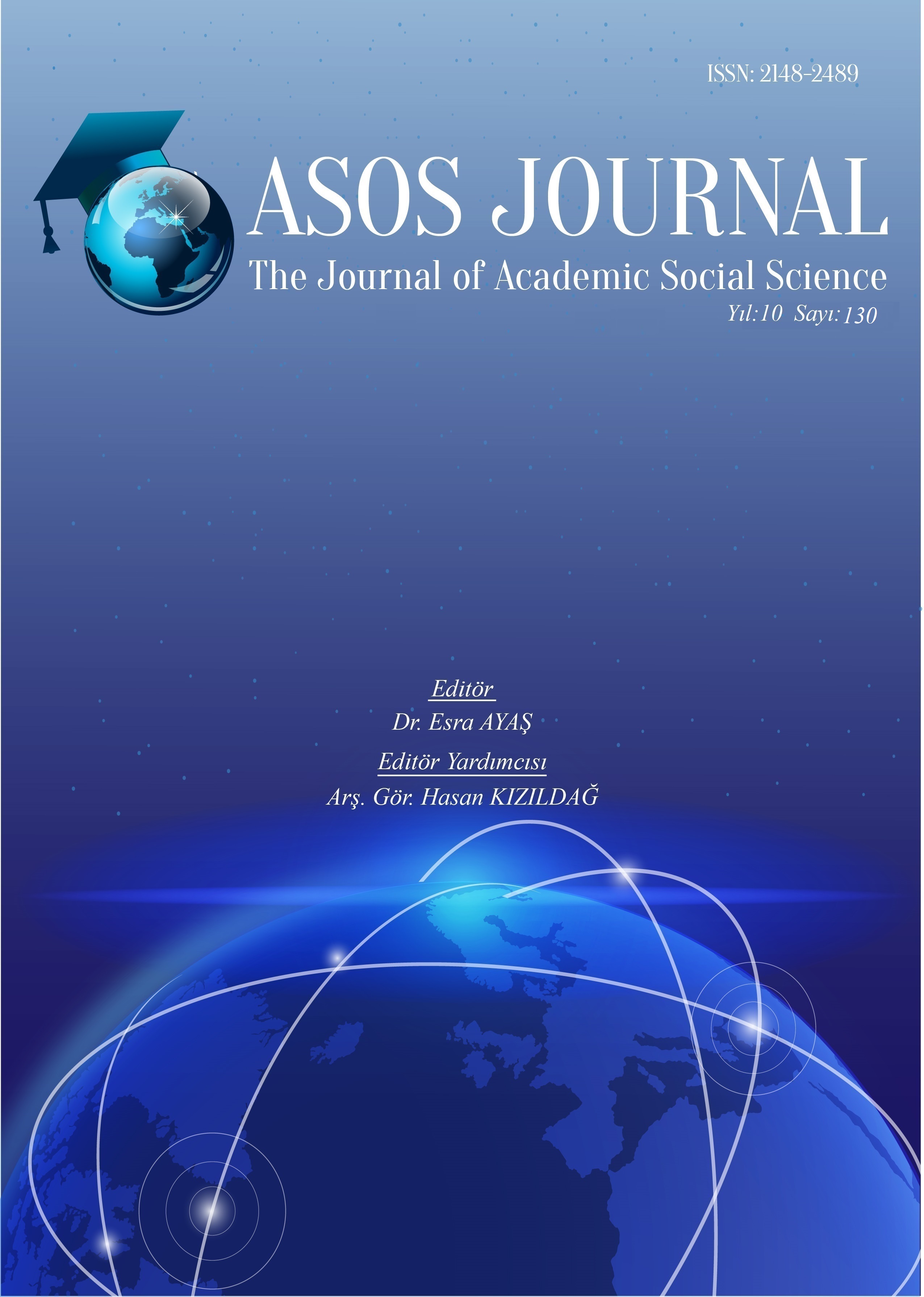CİNSİYETE DAYALI ÖNYARGILARIN TOPLUMSAL ETKİLERİNİN LİSE ÖĞRENCİLERİ ÜZERİNDEN SİVAS ÖZELİNDE İNCELENMESİ
Author :
Abstract
Bu araştırmada toplumumuza geçmişten beri yerleşmiş olan; erkekler ağlamaz, kadın çalışmaz, erkek ev işi yapmaz, kadın araba kullanamaz, erkek çocuk bakamaz gibi cinsiyete dayalı bazı önyargıların ortaöğretim çağındaki öğrenciler üzerinde bir etkisi olup olmadığını ve belirlediğimiz önyargıların hangi yaş grupları üzerinde daha yoğun bir etkisinin olduğunun araştırılması hedeflenmiştir. Araştırma, ilişkisel tarama modelinde yürütülmüştür. Araştırmanın örneklemini, Sivas ili merkezinde bulunan, farklı liselerde öğrenim gören 209 lise öğrencisi oluşturmaktadır. Araştırmanın veri toplama sürecinde araştırmacı tarafından geliştirilen; Cinsiyete Dayalı Kalıplaşmış Toplumsal Önyargı Ölçeği (CDKTÖÖ) önyargıların ortaöğretim öğrencileri üzerindeki etkisini ölçmek için kullanılmıştır. Araştırma kapsamında toplanan veriler; t-testi ve ANOVA testi kullanılarak analiz edilmiştir. Bu analiz işlemlerinin yapılmasında, SPSS 15.0 paket programından yararlanılmıştır. Araştırma sonuçlarına göre; cinsiyete dayalı kalıplaşmış önyargılar cinsiyete ve yaşa göre anlamlı farklılıklar göstermektedir. Erkek öğrencilerin kız öğrencilere göre cinsiyete dayalı kalıplaşmış önyargılarının daha fazla olduğu görülmüştür. Ayrıca yaş ile önyargı arasında da anlamlı sonuçlar bulunmuş, 14’ten 18’e giden yaş gösterge çizelgesinde önyargısal artış tespit edilmiştir. Bu veriler ışığında önyargıların bireyleri etkilediği ve dolayısıyla da toplumun yapısını etkileyen unsurlardan birisi olduğu ortaya konulmuştur.
Keywords
Abstract
In this research, those who have settled in our society since the past; It is aimed to investigate whether some gender-based prejudices such as men do not cry, women do not work, men do not do housework, women cannot drive, cannot take care of boys, have an effect on secondary school students and on which age groups the prejudices we have identified have a more intense effect. The research was carried out in relational screening model. The sample of the study consists of 209 high school students studying at different high schools in the city center of Sivas. Developed by the researcher during the data collection process of the research; The Gender-Based Stereotyped Social Prejudice Scale (CBIAS) was used to measure the impact of prejudices on secondary school students. The data collected within the scope of the research; Analyzed using t-test and ANOVA test. SPSS 15.0 package program was used in this analysis. According to the results of the research; stereotyped prejudices based on gender show significant differences according to gender and age. It has been observed that male students have more stereotypical prejudices based on gender than female students. In addition, significant results were found between age and prejudice, and a biased increase was detected in the age indicator chart from 14 to 18. In the light of these data, it has been revealed that prejudices affect individuals and therefore are one of the factors that affect the structure of society.
Keywords
- Atak H., (2011). Psikiyatride Güncel Yaklaşımlar-Current Approaches in Psychiatry, Ankara.
- Avcı M., (2006).Ergenlikte toplumsal uyum sorunları. Atatürk Üniversitesi Sosyal Bilimler Enstitüsü Dergisi, Cilt 7 , Sayı 1, Erzurum
- Büyüköztürk, Ş., ve ark. (2012). Bilimsel Araştırma Yöntemleri (18. Baskı). Ankara: Pegem Akademi.
- Civelekoğlu, F. R. (2014). Fabrika ayarlarımıza dönüyoruz. (1. Baskı). İstanbul: Nesil Yayın Grubu.
- Cüceloğlu, D. (2012). İnsan ve davranışı, İstanbul: Remzi Kitabevi.)
- Çuhadaroğlu, F. Ergenlik döneminde psikolojik gelişim özellikleri. Katkı Pediatri Dergisi Adolesan Sayısı 2000;21(6):863-868.)
- Güloğlu, B. Ve Aydın, G. (2001). Coopersmith Özsaygı Envanteri’nin faktör yapısı. Eğitim ve Bilim, 26 (122), 66-71.
- Karasar, N. (2002). Bilimsel Araştırma Yöntemi. Ankara: Nobel
- Kreipe, RE ve McAnarney, ER (2001). Adölesan Dönemi. “Nelson of Pediatrics” içinde. (çev.ed.) Tuzcu M. 3.baskı., İstanbul
- Orvin, G. H., Ergenlik, (1997), Çev.: Ayşe Güran, HYB Yayıncılık, Ankara.
- Sayın, Ö. (1990), Aile Sosyolojisi, Ege Üniversitesi Basımevi, İzmir.
- Vatandaş, C. (2003). Aile ve Şiddet: Türkiye’de Eşler Arası Şiddet.1.Baskı, Ankara, Uyum Ajans.





